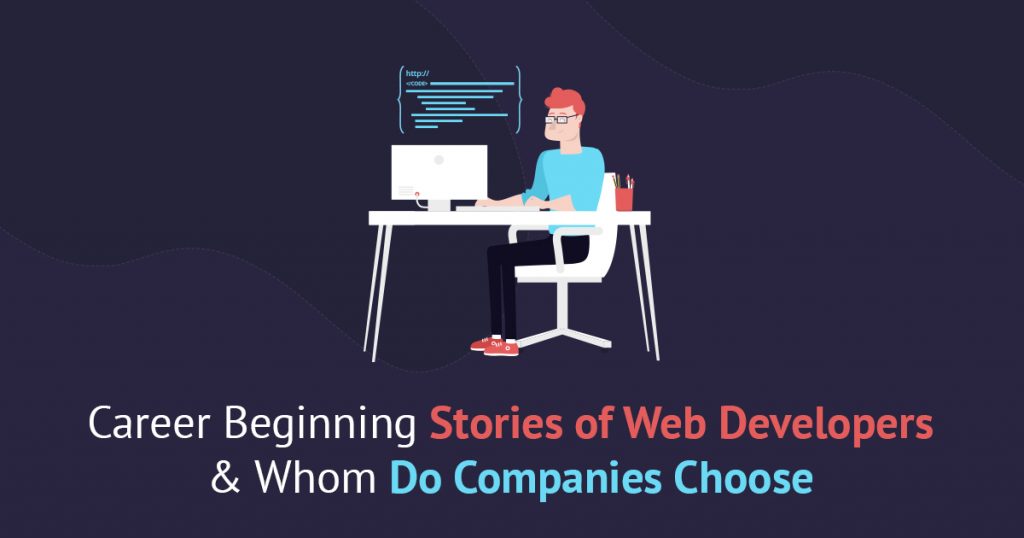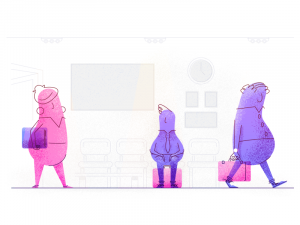Career Beginning Stories of Web Developers & Whom Do Companies Choose?
The career of a web developer is one of the most desired today. But where to start and what to do if you are at the very beginning of this road? They say that the first step's the hardest. Well, it’s true. Let’s say, you have some skills already and have finished some projects for yourself or friends. But how to get the first paid order or the first job at the position of a web developer?

Sometimes the first order comes by chance, sometimes with great effort. Some of the newbies in web development believe that companies prefer hiring a guru rather than a guy with a small portfolio. But this statement needs to be verified because that's not exactly how it happens.
I decided to explore how things work in this niche. On both sides: web developers and companies that hire developers.
This post is dedicated to those who are at the very beginning of a web developer career and for companies that require web developers.
Let’s start by debunking the myth that there is no chance to get a job if you are not a super pro. The thing is, experience doesn’t always play a decisive role in getting a good job. Recent times companies are increasingly saying that soft skills are over the experience. What does it mean and how does it work?
I’ve asked different companies that hire web developers to tell about types of web dev specialists that are in demand today: a jumped-up pro or a regular specialist with soft skills. Soft skills mean an ability to fit in the team and preserve healthy communication. You’ll find their stories in the section:
But that’s not all that we’ll consider today! What’s on the other side? I’ve asked web developers, who already have success about the beginning of their career. You’ll find a lot of exciting and instructive stories on how did others got their very first order. Also, there is some worthy advice for beginners. Let’s see was it difficult and have they been asked about education or certificates they’ve got to make the first step as a professional web developer. Find web developers’ stories in this section:
#The True Stories Of Web Developers Career Beginning
After all, I can’t let anybody go without a present after so a lot of information. You’ll find it below all the stories in the section:
#In case you need proof of your skills to take for an interview
So here we go with stories. I hope that they will bring you confidence and will help to find a place/person you are looking for.
#Whom Do Companies Actually Choose
Victor Bailey, musician, home studio owner and artist

When it comes to hiring a web dev these days, I always go for a regular specialist with soft skills. My online business heavily relies on outsourcing and having people smarter than me work as a team together with me. If I hired a jumped-up pro, even if they were the biggest pro in the world, the downside of having a stuck-up person as part of my team is far greater than any benefit that developer could bring. Also, I’m a big believer in spreading your risks so relying on one pro dev doesn’t seem smart especially if they’re lacking communication skills. If your goal is to grow big effectively, you need to focus on people’s soft skills. The ability of different people within your team to communicate effectively can make or break your business. Team members with big egos are a recipe for a disaster so don’t let their expertise stop you from seeing their personality flaws.
Jonathan Gorham, Founder & Head of SEO at EngineScout

1000% someone who has an ability to fit in with the team and preserve healthy communication over a highly-skilled employee who doesn't fit in with the team. In the past, we've made the mistake of hiring so-called experts who don't get along with the team and it has a huge negative effect on everybody's productivity as people have less enjoyment in the workplace when the wrong people are working there. We always preference for people who have a good attitude, willingness to accept feedback and a desire to expand their knowledge and skills.
Our tactic for hiring the right people: We use a variation of the 'topgrading' method to identify the right candidates for jobs and projects. It's too easy to fake a resume and the interview process can be easily manipulated leading to unqualified candidates. So what we do is have an informal meeting with the potential hire to discuss their future goals to see if they have a growth mindset. Secondly, we send them a small test project to assess their technical capabilities and if they get through this we generally hire them. We've found that a competency test like this is the best way to weed out unqualified candidates. Finally, we put all new hires on a 3-month probation period to ensure it's the right fit for them and us.
Hutton Henry, CEO of Beyond M&A

It depends on your business needs - if you want a higher-quality product, better rigour in the development and better innovation then go for the more seasoned, but less amiable person (assuming they have the right experience). If you want to keep the harmony of the team, but also keep “safe” in regards to innovation then go for the regular person with better people skills.
It is key to have different types of people on the team, I assessed over 200 tech people last year in businesses of all sizes and a whopping 90.27% are predominately the same “type” of person. For business this is an issue – as people who think the same do not challenge each other and this has an impact on the products we make.
So I recommend that companies put work in to actively develop neuro-divergence in their tech teams, that is people with different mindsets.
But also note a few key important factors:
1. For a team to be truly creative you need a mixture of people with different mindsets. This helps create creative-conflict.
2. If you are to foster creative-conflict in your organisation, you need manage communication and meetings so that the more outspoken do not dominate.
3. The “jumped-up” people are often like they are because of their passion for product, where the more amiable people have a passion for people.
4. Actively recognise and reward the different way of thinking in your teams.
5. Force people with different mindsets to work together for short period of times, on a specific small unit of work, with a clear remit and an allowance to fail.
6. Sometimes “jumped up” behaviour is masking frustration or inability to understand what is happening in the organisation.
7. Ensure you have a coaching program for your teams.
Joe Stacey, Javascript Recruitment Consultant at Consortia

Agile ways of working; including stand-ups, showcases and community-facing events are providing a great space for those developers equipped with good people skills. There is still room for the stereotypical “introverted coder” who may not integrate so well, however, with the development environment as a whole becoming fused and with more cross-functional teams, softer skills are increasingly sought after.
Mark Burgess, Head of Delivery at Talent Locker

This is an age old question which usually comes in the format of ‘do you keep your best salesman even if he is destroying your otherwise positive working environment?’
Whether you place purely technical skill or rounded soft-skills at the top of your criteria is going to depend upon the project and your need to lead the person you are hiring. If you simply need the best results on a set of core deliverables and your new hire will work remotely, then going for the most technically fine-tuned option is going to be the best option. They can simply deliver on your workload and produce the best results for you.
However, if you are hiring someone with an eye to managing projects, leading others or engaging with clients over time, then soft skills become more important. At this stage, you will then look for rounded professionals, ideally with experience in mentoring others as this usually suggests they have experience of working with others both inside and outside the business. Meaning they are likely to be a very strong candidate to do it again for you. In our experience it isn’t usually a case of technical skills vs. soft skills, we would usually be able to find someone at the top of their game who can also deliver on the communication and leadership skills that you need too.
Simon Royston, the Founder and Managing Director of The Recruitment Lab

Broadly speaking, I believe you should always try and hire the very best possible talent available to you. As a business owner or manager, you should want to surround yourself with ”rock stars” that can push the organisation to new levels. However, if you are thinking of hiring the ‘jumped-up pro’ it should never be at the expense of sacrificing team harmony. Having a solid team of likeminded professionals all pushing in the right direction is priceless. So, for me it comes down to the experience and availability of the management team around this potential pro.
If the management team responsible for the pro feel comfortable managing and harnessing the energy, understand there could be some bumps in the road and that it could take more investment in helping integrate this new hire into the team, brilliant. If you go down this route then you are immediately diversifying the team or company culture and adding significant strength to the organisation. Sometimes though your management team can feel stretched, they may not have enough ‘bandwidth’ to smooth the integration, they may feel the skillset is actually beyond their own knowledge base and that it is an unnecessary gamble with the current team harmony and productivity. In which case, you go for the regular specialist with soft skills. There is nothing wrong with that and do not see it as being a weak choice. See it as being a considered and logical choice given the environment the new hire would work within.
Matt Larner, Managing Director of ClickSend

We would definitely choose the regular specialist with the right attitude and ability to communicate over a jumped-up pro. In young businesses and small-medium enterprises, it's especially critical that the team are able to communicate effectively with each other. Any potential skills gaps can be trained, if the employee has the right attitude. Further, the lack of ability to be a team player or communicate well with coworkers can end up creating more headaches for you, as their manager/supervisor.
It's very important to me to cultivate a good working culture in my company - when staff are happy and fulfilled, they are more productive. It also helps to reduce staff turnover, which is expensive and we lose a lot of on the job knowledge. I have seen how hires who are uninterested in fitting in with the team cause dissatisfaction with other team members.
Priya Gathani, Head of Talent at Venturi

We are Venturi - a Technology recruitment agency that works with both candidates and clients. As such we have a unique insight into both what a client needs to be hired by a Tech company and what Tech companies are looking for.
We have found, through a decade of placing candidates in tech roles, that tech employers place serious value on the soft skills (communication etc) because of the prevalence of agile and scrum methodologies in many tech companies.
However, what we've found clients really engage with is the 'little extras' that a candidate can bring to the table. A GitHub account or a personal website might be a great decider for those looking to hire a software dev, for example, as it demonstrates a true passion for their craft.
Ellie Shedden, Founder & Director of THE-OOP.COM

I own a digital marketing and web design agency so this is a problem we face quite often! In my experience, a mix of specialists and those with soft skills is what makes the business run smoothly. We tend to focus on soft-skills when hiring for permanent positions within our team, as it's important that our small team can work together and trust each other, so communication is vital. What's more, if an employee shows potential we can always send them to training to learn more in-depth skills.
However, sometimes we really need a specialist to complete a project, and we usually need them fast. In this case we advertise for a short term contract and find the person with the most skills who can slot right in and get the work done. We usually take these people on contract so that if there are any issues with the rest of our team we do not have to continue with them long term.
Jagoda Wieczorek, Senior HR specialist for ResumeLab

We’re currently in a hiring boom ourselves here at ResumeLab, and both types of candidates have their pros and cons.
We get a few “jumped-up pros,” those who are at the top of their field, whether front end, back end, full-stack, or elsewhere. On the plus side, these candidates need little training, hand-holding, or supervision — once hired, they can really just start working.
However, these super-skilled professionals often feel entitled to whatever they want, simply due to their high pay grade. Since the recruitment process of a web developer or similar role is often a drawn-out, arduous process, some hires feel as if the rules are only suggestions, knowing that losing them is all but out of the question.
Regular specialists make up the majority of incoming applications, so there is no lack of applicants. Because there are so many of them, it can be tiresome to sort their resumes, phone each candidate, and organize sample tasks. But, we have the option to hire there for those who really embrace company values, like growth and impact. We can sift through those candidates who really would be passionate about working on our products and to be part of a more start-up atmosphere.
On the other hand, many of these regular specialists excel in other areas, especially having soft skills and emotional intelligence. We’re a young organization with friendly, helpful company culture, and these candidates are usually the best fit all around.
When choosing candidates, we, of course, prefer the most skilled developers we can find. However, we draw the line when they’re not a company fit. We have several rounds of interviews for each candidate, including a group/team interview. If our current developers don’t feel as if an applicant would be great, either with their work or in fitting in with the others, we move on.
Trevor Lim, Freedom Hirer, Lifestyle Manager

I would ultimately choose a regular specialist with soft skills.
However, for a start, I'd go for a pro to set things up for me on a project basis, and arrange for a short term consultation.
Then I'd hire the regular specialist with soft skills and have this pro specialist to guide him through the project for the next 3 to 6 months.
This way I'd be able to upskill a team member that is more suitable for the company's culture, at the same time not compromising on the quality of the work.
I have had my fair share of struggles in choosing skills/experience vs soft skills/values.
But it is evidently true that bad soft skills are the foundation of all politics and unethical business practices in business.
Take one for example. Were someone with insecurity come into a company where everyone's skills are unmatched between each other, then there would be moments of causing strife within the team to be happening so others go down.
Skills can always be taught or improved, but Values and soft skills are mostly innate due to guidance since young, and it's going to take you way more effort to adjust them compared to improving skills.
Salman Saleem, Cloud Community Manager at Cloudways

When it comes to hiring, my company always prefer a candidate whose skills may not be a 100% fit but his attitude for learning and maintaining a good relationship among peers is high i.e a regular specialist with soft skills more or less (an ability to fit in the team and preserve healthy communication). The ideal candidate for my company will be the individual who can be trained as per the need of the hour and maintains a healthy working environment. The goal is to transform the candidate into a leader who can lead and inspire the team.
McKenzie Hamp, Director of People & Culture at 7shifts

At 7shifts, we would always opt for the latter — hiring a regular specialist with the ability to fit into the team and preserve healthy communication. To us, someone who aligns with our core values and is a team player will alway outshine those that have the hard skills but don't make a good culture fit.
Our development team has grown by 108% people so far in 2019, and we take the same hiring approach to each one of those candidates — focus on the soft skills and culture fit, rather than the technical skills on paper. After all, at the end of the day, you just want to hire someone you'd go for lunch with 🙂
Michael Green, Vice President of Nelson Frank

From my experience, the ideal candidate should be able to demonstrate strong technical skills, while at the same time show excellent interpersonal skills. But we don’t always live in an ideal world, so often employers have to make a choice about what’s more important.
Hiring great development talent isn’t just about hard skills. When we’re sizing up a candidate, we focus on how they interact with us and whether they’re passionate about their work. Hiring for fit is really important too, so we’ll also try and identify whether a candidate matches up with the company's culture and the way its existing teams like to work.
Employers want to see candidates who take initiative with their personal growth and have ambitions to develop their skills. An eagerness to progress is often just as valuable as proven skills; after all, technical skills are easier to teach than soft skills like communication and teamwork.
As a recruitment agency, we’re always evaluating the tech market to spot hiring trends. We’ve seen that employees who’re willing to learn and who’re given the opportunity to develop their skills become truly valuable to their businesses long-term. We always recommend that clients establish room for professional growth when hiring for a web development role. When you’re working in a sector as fiercely competitive as tech, offering the right upskilling opportunities can have a significant impact not only on attracting the best talent, but retaining it too.
Gargi Rajan, Head HR of Mercer | Mettl

Any hiring is the sum of two factors today - the competencies in their subject matter and soft skills they bring onboard, which easily helps with their integration into the existing team and organizational equilibrium. Hiring a web development specialist is no different. The person should be adept in HTML/CSS, PHP, ASP.NET, RDB, and OOP and have an understanding of SEO, network analytics tools, and network diagnostics. At the same time, the individual should have the ability to display abilities to bond with the team, help other members with their tasks - if need be, and to create a positive environment with their behavior and attitude.
Hiring for just one aspect (either competency or cultural fitment) could lead to a loss of investments on account of recruitment, onboarding, and employee compensation and benefits. Apart from these measurable and visible losses, the intangible and immeasurable cultural impact a bad hire could entail could have negative consequences irrecoverable for a long time.
Chris Chancey, Founder of Amplio Recruiting

While technology jobs are in high demand right now, many employers would rather leave a position open than hire a ''pro'' who lacks the skills necessary to communicate and collaborate with the rest of the team. The truth is, in the modern workplace, regular employees and technology specialists are interacting more and more to complete projects and accomplish company objectives. Having professionals or experts who have issues with communication or collaboration is a sure way to create silos, stifle productivity, and cause costly delays on project timelines. Both a specialist and a ''pro'' have the requisite hard skills to get the job done. However, a specialist with the right soft skills definitely has a leg up over the pro.
Unfortunately, many employers are still lagging behind in terms of providing soft skills training for their technology staff. I would say, when hiring an IT pro, assess their trainability-- some people can be trained for soft skills but some just cannot. Behavioral assessments during the interview process can help with this. If you must hire a professional who does not have the necessary soft skills, be sure to hire one that demonstrates a willingness to learn essential communication and collaboration skills.
Maksym Kunytsia, Chief Product Officer at Chanty

There are many factors that have an influence on hiring. The first is the budget. If it is limited, then you probably need to decrease your requirements and try to find someone less experienced, but "hungry".
The second thing is task complexity and schedules. If you for sure know that the task to be solved requires strong knowledge with limited time, you need to keep your focus on candidates’ hard skills.
And last, but not least: who will work with your new employee. It is very important to keep a good and stable work environment within your team, so if you are choosing between a pro that is difficult to work with and a pleasant regular specialist – you know what will be better for your team’s health.
Husam Machlovi, CEO of With Pulp

Absolutely, our company would choose the specialist with the soft skills.
More than anything, we want to preserve our company culture. And the culture is made by the people. Negativity and toxicity is contagious and we work very hard to only bring in people that do the emotional labor of not falling into the negativity traps.
A specialist with soft skills can collaborate. Collaboration is about being open minded and listening to other people. This means that they’re open to learning and can grow their practice.
A jumped-up pro who is arrogant about what they know will be tough to work with and also over time, their skills may be stunted. The jumped-up pro will not be as receptive to new information because they think they know it all.
I would make the argument that someone who is arrogant cannot be a professional. And instead, someone with soft skills, even if they’re not the best at what they do, is a true professional. Because being a professional is about recognizing that we can all improve and also that we do better work together.
Pete Sosnowski, the VP and Co-Founder at Zety

If you're hiring for your own company with a clear vision of long-term projects, you need to create a team that will make this happen. You can gather all jumped-up A-Players equipped with all the necessary tech skills, but if they can't work together to deliver, you may as well be doing the job yourself.
What we value most in web developers is will rather than a skill. Why? We can train a person to become a pro in Agile programming. We won't teach a person the creativity, critical thinking, problem-solving, or team collaboration.
Web developers are usually required to deliver a product, so the accountability and ability to keep deadlines and to own projects are crucial here. The soft skills allow the less experienced, web developers, to push through any obstacles, make use of team effort and aim toward upskilling.

Pic by Razvan Vezeteu
#The True Stories Of Web Developers Career Beginning
Sviatlana Kuchynskaya, Front-End Developer at ScienceSoft

I’ve started to look for my first IT job when I was a 4th-year software engineering student. My major was healthcare information technology, but companies in this field didn’t want to employ a student with zero experience in real-life engineering.
Accidently, I found out that ScienceSoft invited talented students to go through short initial training, and, in case of its successful completion, offered an employment opportunity. I signed up and decided to take the Web-development / Front-end direction.
Initial training lasted for about 3 months and was quite stressful. Actually, this part of my life can be called “How to lose 18 pounds in 6 months”. Even though not a novice to coding, I had to study piles of materials to completely dive into web development as I strongly wanted to become a good specialist and repay the trust of the company. During training, Senior developers (our mentors) continuously reviewed the code I wrote and suggested enhancements. The input from experienced colleagues was incredibly helpful. I doubt I could make such progress so soon if studying on my own.
My first project was a simple single page website for a taxi service, but quite soon I proceeded to complex enterprise-level solutions.
My advice for newcomers will be: “Don’t panic, just move ahead even when everything seems to be hopeless.”
Shayne Sherman, CEO of TechLoris

The interesting thing about web developers is that most job listings show that they require a degree but I've never actually been asked to show it. I do remember, though, in the interview, I was asked what resource I would turn to if I got stuck and didn't know the answer. I said I'd kept my textbooks from school. My interviewer laughed. Now I know it's because the internet is the only source you'll ever need in this job and textbooks only cover about 3% of what you'll need to know.
As for advice to a novice web developer, don't expect to know everything and don't get frustrated when you don't know something. The field is expanding too fast for that to be expected. The real skill of a web developer is the ability to find and implement the answers you need quickly. In your interview, if you don't know the answer to a question, don't let it throw you off. Instead, roll with it, maybe even ask them. This shows you don't panic when you don't know, you just figure it out.
Derrick Rehn, SEO specialist at Integritive

After graduating (with a degree in philosophy!) I decided to dabble in web development and eventually became a certified developer from a local community college. After helping a non-profit via some volunteer work one of their directors recommended me to a successful local writer. This was my first project.
That was not as such difficult. While there are not many companies out there that don’t have a website, there are tons of folks who need their site redesigned. People need to updating and modernize sites they’ve had for years to stay relevant. In the era of SEO not staying up to date means not showing up on Google.
Did they ask me about my education or certificates I've got? To the extent that they wanted a portfolio of websites that I had worked on. To that extent, I just used examples from when I had attained a certificate as examples of my work.
My advice for a novice who's just beginning his/her web dev career is to learn SEO. It’s becoming more relevant every day. Everyone wants traffic for their website. If you can, at the very least, optimize their site to show up for some relevant search results they’ll likely be thrilled.
Anjana Wickramaratne, CEO of Inspirenix

I got my first web development order from a local business who was looking to expand, I contacted the business owner and offered him a proposal for website development as he was looking to expand his business. It was not the easiest thing to do, I had to explain to him how a website can benefit his business and how his business can stand out from his competitors with a website. After a lot of convincing, he agreed to have his own business website, but not sure he was going to give the job to me as I had no experience as I was then just starting out my web development career. Therefore I had to make a deal with him, I offered him 100% money-back guarantee if the website I develop does not satisfy him, and also I offered a much lower price than any other web developer as I wanted to first gain authority for myself and then charge higher prices.
My advice for new web developers is that start small, charge lower prices and first gain some authority for yourself. Don't charge higher prices at once as no one will give you web development projects as you are inexperienced and they have the fear of losing their investment on you. When you have good authority clients will have much more confidence in you and will follow you with high-value projects. Therefore be patient, charge lower prices at the beginning to gain some authority.
Jacob Wheeling, Developer at Codeprint

Formal educations don’t mean much in web development, in fact it doesn’t mean anything at all. I began developing websites about 8 years ago and haven’t looked back. Getting your first client can be difficult, but not as difficult as you might think. The most important thing is having a portfolio for potential clients to be able to see. If you are just getting started, this means building websites yourself to include in your portfolio. Once you have some examples of your capabilities you are good to go, put yourself out there on Upwork, Freelance, and social media!
Bryan Osima, CEO of Uvietech Software Solutions Inc.

I fell in love with the internet in my teens and found some tutorials online and started building websites. I had built several personal, based on my interests, before I thought about building for others, as a career.
The first job I got to build a website, was from a local business who wanted to get their site up quickly.
They didn't have a website up then, I wrote a proposal for them and went and knocked on their doors and told them the benefits to them of having a website.
All they were interested in was my portfolio at that time. They never asked about my credentials. Once, they saw the body of work I’d amassed at that time, they were sufficiently impressed and commissioned me to build their company website.
To aspiring developers, I’d say the biggest asset you’ll have in looking for work is your portfolio. When starting out, build as many websites as you can. Build for anybody who’ll let you build for them. Sometimes you might build for free but see this as valuable portfolio building. Eventually, that portfolio will help you land well-paying client jobs.
Also, don't be scared to go knocking on doors of businesses and telling them what you have to offer. Sometimes they may have websites that you could make better or improve on. Get your foot in the door and start from there.
Matthew Edgar, Partner & Consultant at Elementive

My first web dev client was through a referral. A co-worker at my full-time job knew I helped people on a freelance basis and had referred me to a smaller content publisher. I talked with the owner of that company and quickly began helping them with all aspects of their website's technology and re-tooling their website.
That was not especially difficult to find one. My first client, like almost all the clients I've worked with over the years, came in as a referral from somebody who knew me. That helped to establish trust more quickly and the conversation was less about having to sell them on something and more about determining if I could help.
My first client project was helping to re-tool the website's backend and other related areas. Through this project, I got to learn way more about databases and how they can be your greatest friend or foe depending on how you store the data.
Honestly, I've never had a client ask me about my educational background. Despite this, I have prioritized education within the field in formal and informal ways. This includes earning a Masters, teaching courses, writing books, reading books, going to conferences, speaking at conferences, and more. I'm not positive but am pretty certain, this comes through when I talk to clients and reduces their need to even ask about my background. As a result, I recommend people know their stuff so well that nobody questions if you do.
My advice for a novice who's just beginning his/her web dev career: Eventually, you have to find your niche. But don't niche down too soon. Explore everything and take a more generalist approach when helping clients at first. In my first five years, I said yes to almost everything but made it clear to the client what my competencies were and weren't. As a result, I got to take on tasks involving SEO, analytics, content, design and more. Through this, I was able to learn about how websites work and how web dev connects to other disciplines. For me, I discovered I was really good at the area where web dev and SEO intersect, which allowed me to niche down into technical SEO.
Will Manuel, President / CEO at Core Mobile Apps

As I sat in the small cold classroom and waited for the board members to arrive, I anxiously straightened my printed website portfolio to make sure it looked as presentable as possible. My meeting contacts for the day included members of the Florida Landscape Architecture Bash (FLABash) at the University of Florida. There were three members, all of which that came in about 5 minutes behind each other. That allowed me to establish some personal rapport with each person as they arrived before the meeting happened and helped me calm my nerves and speak smoothly upon the commencement of the meeting.
At the time I had only developed personal websites for myself and for friends and this was the first project where I would have a very large audience; one with extra critical eyes as these people were all architectural design students and faculty. I spent the first 15 to 20 minutes simply listening to each board member spell out their goals for the website. As I feverishly jotted down every detail, I started to wonder if I was up for the task. After they finished giving me the ideas that they had for the website, I handpicked the top three initiatives to focus on and put everything else on a “wishlist”. Surprisingly the group agreed with this approach and thought it was a good idea to create the website with those three main initiatives intact and then iterate the other functions at a later time. I was so ecstatic about them accepting my recommendation that I nearly forgot everyone's name, including the person who invited me (whom I had met 2 other times prior). Doh.
It was a groundbreaking day for me and felt good about how the meeting went. A few days passed and I hadn’t received any word or feedback as to whether or not I got the gig. I started to lose hope and thought back to what I did that may have turned them off. The very next day I received an email asking me to meet with them and have a contract ready to sign! It was one of the happiest days of my professional career.
Fast forward 20+ years, I am still developing websites to this day!
It wasn't difficult to find the first order. I worked in the computer lab on campus as a technician mainly troubleshooting technical issues with the desktop machines and printers in the labs and knew nothing as it related to web development at the time. I’ve always been creative so I started to dabble a bit with Adobe Photoshop and later on, Dreamweaver. Once I felt comfortable with these development tools, getting clients was so much easier.
And yes, I've been asked about my education and certificates. But they knew I worked in the computer lab on campus so they assumed I was good 🙂
A piece of advice for a novice who's just beginning his/her web dev career: The biggest thing you need to know and follow is never stop learning. As with anything tech based, it is essential to keep your skillset sharp and stay ahead of the game in terms of educating yourself. Everything changes quickly so you will either become obsolete or a pioneer; the way you hedge towards the latter is by staying on top of your skills and learning every day. This will put you in a prime position to succeed and thrive as a web developer.
Will Hankinson, Technology Lead at Dagger at IntroCave

I picked up enough basic PHP/MySQL in grad school to be dangerous, and at the time (2007) I was building a lot of Flash games as a hobby. My first job as a web developer came from a small startup who was willing to train me up on Rails if I could provide a Flash front-end (something their existing team had no experience with).
From there I thrived for quite a few years in the space of Flash on the frontend with Rails on the backend (this was during the heyday of Facebook games and that skillset was in high demand).
If I had to take my experience and give advice for someone going forward, it would be to tinker and dabble with the latest technologies. Today that's probably node and react, but it will change over time. There will always be companies out there looking to hire people who are using those tools, so becoming an early expert on them can give you an advantage when looking for a job.
Anita Anderson, Aca Web Consulting

As a successful Art Directer in the nineties, I found myself burnt out on print media and wanted to learn about website development. In early 2001 I attended a certification program at my junior college and quickly excelled at it. I got on the Dean's List and caught the eye of the Department head. Through the Junior College, they had requests for interns and paid internships. I was recommended for a paid internship at a local herb farm for website development. That was my very first paid (albeit not very much) gig.
When you're first starting out, in order to build up a portfolio, you will need to charge considerably less than those with 20+ years of experience, but you should not allow yourself to be taken advantage of and make next to nothing. You have the knowledge, but still, you will need to learn the ins and outs of the industry, so it's assumed you will charge at least 70% less than your executive counterpart (which is still considered a lot).
Through the years I learned hard lessons, but the most important I would say is don't undervalue yourself. Know what you're worth, build up your skills, do your best and meet deadlines and don't let companies take advantage of you.
#In case you need a proof of your skills to take for an interview
As far as you are a ready to start a career of web developer and need a proof of your skills in any CMS you’ve chosen, you can get a certificate online at TemplateMonster Certification Center for free.
It’s a boost for your career. And it’s free, because we understand that it’s needed for guys who don’t really earn yet by web development.
So study, learn several particular CMS (WordPress, Joomla, MotoCMS, OpenCart, PrestaShop, HTML, etc.), pass online test and get the certificate that will confirm your knowledge.
Don’t hesitate to share your story in the comments section below if you are looking for an order.
Also, if you are hiring now, you may post a comment also.
And if we’re lucky, both sides will meet here.
Get more to your email
Subscribe to our newsletter and access exclusive content and offers available only to MonsterPost subscribers.

Leave a Reply
You must be logged in to post a comment.